Engadget has been testing and reviewing consumer tech since 2004. Our stories may include affiliate links; if you buy something through a link, we may earn a commission. Read more about how we evaluate products.
PlayStation 5 review: Great 4K gaming with an odd design
Sony enters the next-gen console fray with solid exclusives.
Sony knows it's on top. The PS4 handily outsold every other previous-generation console. But instead of coasting on its success, the company is staying aggressive with the PlayStation 5. It generally matches the Xbox Series X’s fast hardware, and it also has one of the most innovative controllers we've ever seen. While the PS5's design may be a matter of taste, at least Sony succeeded in delivering something Microsoft couldn't: must-have games that actually take advantage of its hardware.
So much of the PlayStation 5 screams "next generation" — and that's a good thing when many gamers are eager for a reason to upgrade. Because let's face it, the last round of systems were kind of a mess. The PS4 and Xbox One aged so poorly as consumers adopted 4K TVs, that the old hardware practically demanded mid-cycle refreshes: the PS4 Pro and Xbox One X. And while those systems were certainly powerful, bringing us close to the dream of 4K gaming in our living rooms, they were bogged down by slow mechanical hard drives and hardware that was easily outmatched by basic gaming PCs. They were a stop-gap measure, and nothing more.
This is the ideal next-generation console from Sony, with powerful hardware, fast load times, a great controller and a choice selection of launch titles.
- Fast 4K gaming
- Minimal load times
- Solid launch lineup
- Excellent DualSense controller
- Flimsy case design
- Less storage space than Xbox
- Limited backwards compatibility
The $500 PS5 we’re reviewing, and the Xbox Series X, are a step into a glorious new world of console gaming. And if you don’t need a disc drive, you can also grab the PS5 Digital Edition for $400.
Hardware: So, so big
The PlayStation 5 is so large that it dwarfs every other console under my TV. It towers over the Xbox Series X, which is a big boy in its own right. The PS5 measures 15.4 inches tall and 10.2 inches deep, and it weighs a hefty 10.2 pounds with its required stand. But the PS5's extreme scale mostly comes down to its unique design: The center of the console houses all of its internals, but it’s flanked by two large sets of fins. The entire system looks like Sony exploded a vintage PlayStation 3. The aesthetic reminds me of the cheesy retro-future styling of Back to the Future 2.
To each their own, right? As someone who's spent most of my life adoring Sony's industrial design, I don't mind the look much. But I was surprised by just how flimsy and precarious the PS5 felt the first time I held it. That’s the exact opposite of what I want from a $500 console. I think my main issue is those side panels — Sony basically sandwiched its premium new console between two thin pieces of plastic. I was always worried it would fall when I was holding it, and I don’t expect it would survive even a short drop. The Xbox Series X may look duller by comparison, but it's a solid and sturdy device.
I get it: Sony wanted to optimize airflow as much as possible to keep the PS5's CPU and GPU cool, so the plastic fins serve a genuine purpose. That's why Microsoft basically made its system a mini-PC tower. But Sony surely could have come up with a design that wasn't so unwieldy.
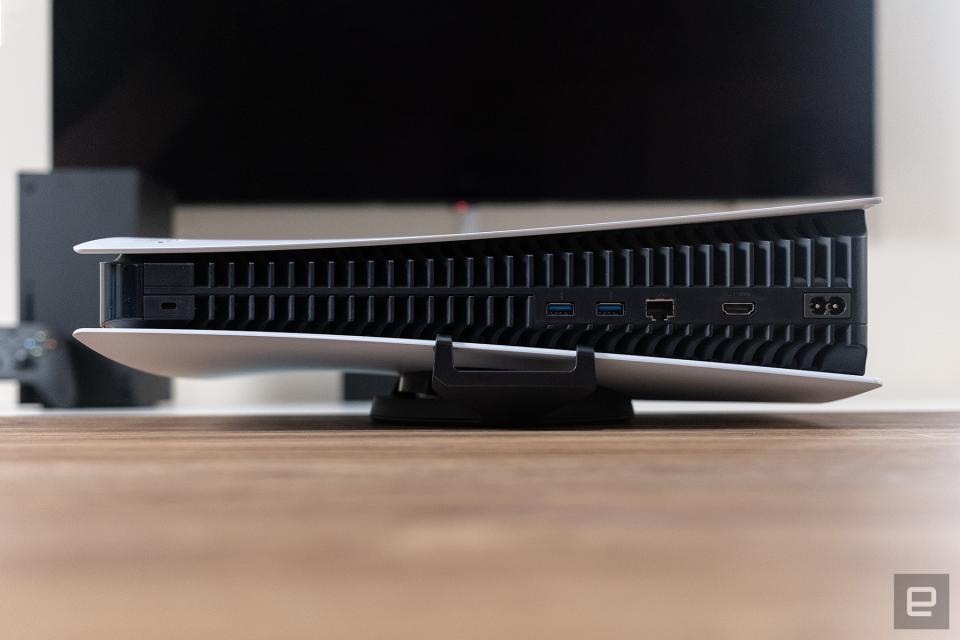
While I have many concerns about the way the system looks and feels, under the hood the PS5 is poised to deliver a solid 4K gaming experience. It's powered by a custom eight-core Zen 2 processor and a 10.2-teraflop RDNA 2 GPU. On paper, its GPU would seem to lag behind the 12-teraflop Xbox Series X, but remember that teraflops can be a notoriously sloppy way to determine how fast a system can actually perform.
Both the PS5 and Xbox Series X feature 16GB of GDDR6 RAM, which each system handles a bit differently when it comes to overall memory bandwidth. The next-gen consoles also rely on NVMe SSDs for storage, an upgrade that'll make your games load much faster than older mechanical hard drives. One big plus in Sony’s column: It allows you to plug in a third-party SSD by removing a side panel, giving you far cheaper storage upgrade options than Seagate's $220 1TB SSD expansion card. But just note that you can’t add a new SSD at launch, and the drives that meet Sony’s spec won’t be cheap, so don't go filling up your drives right away.

Sony's new DualSense controller is your gateway to the PS5, and for once it doesn't look exactly like the original PlayStation's controller. Sony stuck with that tried-and-true design for decades, but this time it went with something different. The DualSense is larger than the DualShock 4, with thicker grips that make it much more comfortable to hold. Its basic layout is the same, except now the buttons look like transparent jewels and there's a button for muting the built-in microphone. It’s mostly white design is sure to look messier than the PS4's controllers over time, but after a week of testing it still looks relatively clean.
What's most impressive about the DualSense is what's inside — chiefly, some of the most advanced haptic controls I've ever felt. Its analog triggers can be manipulated on the fly, to recreate the sensation of pulling an arrow back in a bow, or running out of ammo in your gun. And you can forget about the basic vibration from the DualShock 4, the DualSense almost feels like it's alive in your hands. I nearly jumped out of my seat the first time I loaded up Astro's Playroom. The DualSense's vibration is so finely tuned that you can feel a distinct difference when Astro is walking over sand, wood and metal surfaces. It feels truly next generation in a way the Xbox Series X's controller doesn't.
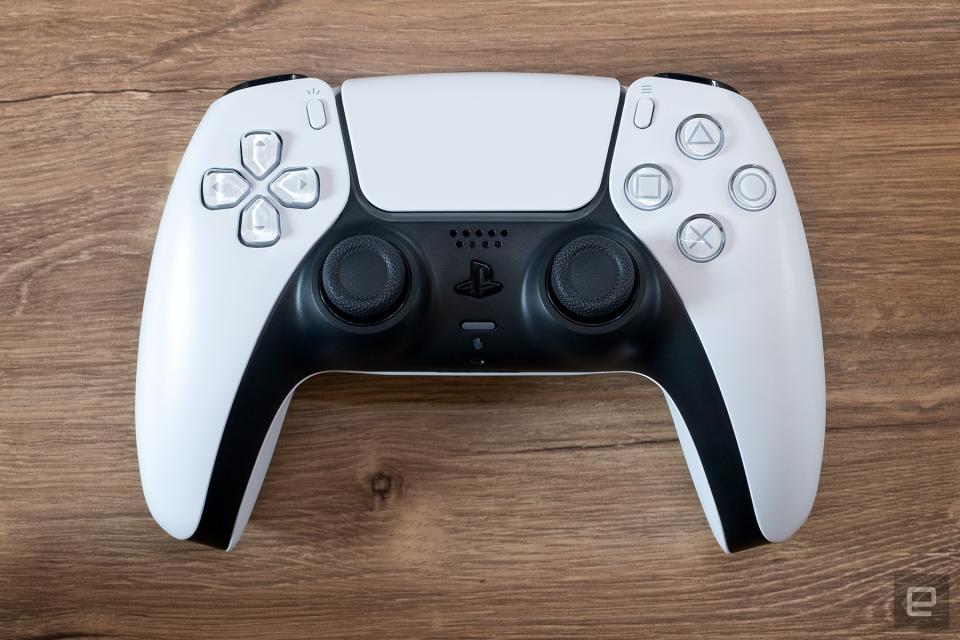
Setup: A stand, really?
Before you can even plug in the PS5, you'll have to learn how to install its plastic stand. While the console can stand vertically on its own, Sony recommends using it for both orientations. And once you handle the console, it's easy to see why. The PS5 is just too precarious when it's standing up without a stand; all it takes is a light brush from a child or pet to send your $500 console crashing to the floor. And if it's sitting horizontally, the system wobbles like an enormous egg, which also makes me worried it'll eventually roll off my table. So the stand makes sense — but I don't have to like it.
It screws onto the bottom of the console if you're standing it up, or slides into the back if it's going horizontal. Sony includes an instruction sheet that's relatively clear, but I'll be honest: That's the last thing I want to look at when I just want to play some games. In horizontal mode, I also found that the stand slipped out easily if I needed to adjust the console, or pull it forward a bit to plug in some cables. There's nothing securing it to the system; it just bites into the rear of the console, making it appear as if it's floating in the air.
I won't harp on this too much, but I'm sure Sony could have come up with a design that didn't feel so overcooked. The PS4 and PS4 Pro were just angular slabs of plastic. But they felt solid, and it didn't take an IKEA instruction sheet to figure out how to put them in my entertainment center. I'll be honest, I had a hard time figuring out the right way to lay the PS5 on its side, since there's no visual indicator of where the top and bottom is. I was baffled that Sony's engineers could overlook such a simple usability flaw.
Once you figure out the puzzle of the PS5's stand, you just need to flip it on, go through the setup process and start downloading any required updates. And unlike the Xbox Series X, you can actually play something without waiting for a download and installation. Astro's Playroom ships with every system, and it's a smart way to get you used to the DualSense's capabilities. I was also pleased to see that downloading games from Sony's store was far faster than with the PS4. Over my wireless connection, it sucked down a 40GB game in around 50 minutes.

In use: Impressive next-gen gaming
Spider-Man: Miles Morales isn't a next-generation exclusive, but it still does a stellar job of showing what the PS5 is capable of. By default, it runs in 4K at 30 fps with ray tracing and tons of graphical flourishes. Everything looks spectacular, especially the realistic reflections in water and glass. But, this being a Spidey game, I preferred the fluidity of performance mode at 60 fps, which drops ray tracing in favor of smoother overall visuals. It made zipping through the city feel far more thrilling, though I definitely missed the added realism of ray tracing in cutscenes.
Thanks to the PS5’s SSD, load times are minimal in Miles Morales. It takes around 15 seconds to get from the title screen to gameplay. And while playing, I rarely encountered load times, even when jumping out of complex buildings into the game’s loving recreation of NYC. One cute thing I appreciated: you can actually hear Miles web shooters from the DualSense controller.
While the performance mode doesn't run at 4K, it still looks relatively sharp. I would have loved the option of a 1080p/60 fps mode that included ray tracing, though. I'd happily sacrifice a few pixels to get a fast frame rate and ray traced realism. Generally, that's the stand I take with every game.
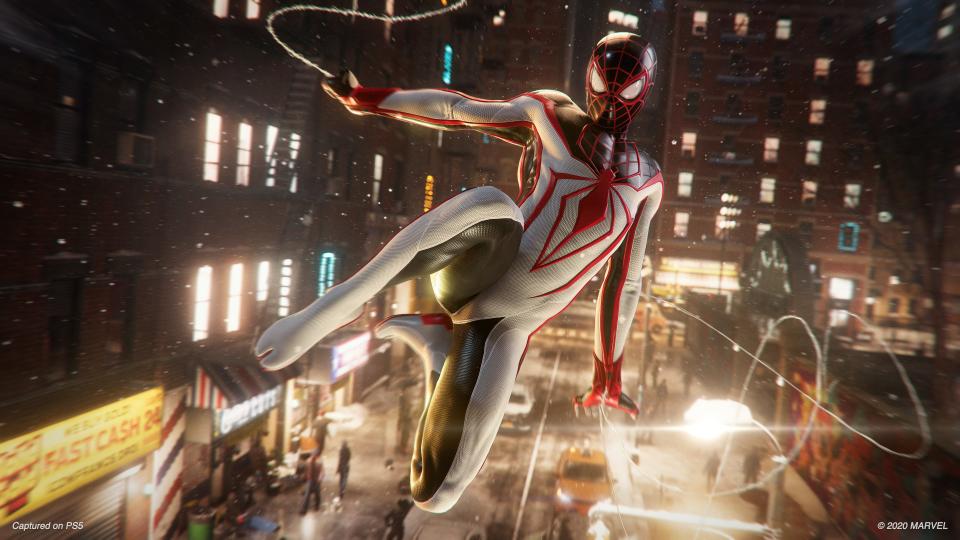
Devil May Cry 5: Special Edition, for instance, also has a ray-tracing infused 4K mode. But while it looks good, that felt a bit too slow for the fast-paced hack-and-slash nature of that game, so I opted for the 1080p/60 fps mode instead. And if you've got a newer 120Hz TV, you can also run the game at that refresh rate for even smoother performance, without ray tracing and other graphical upgrades.
The PS5's interface features a new control center, which pops up when you hit the PlayStation button. It makes it easy to keep track of the games you're playing and recent captures. But the most significant addition are "Activities" cards, which can show you tips for the level you're in. You can even look up the current mission you're on, refresh yourself on your objectives, and get an estimate on how long it'll take to finish. I won't have much use for the hints, but it's nice to have a basic sense of how long a level will take, especially when my gaming time is so limited these days.
In lieu of other new games, like the Demon's Souls remake, I also spent a bit of time revisiting PS4 titles like Ghosts of Tsushima. It's been updated to take advantage of the PS5's hardware, so now I can finally get my samurai action on at 60 fps. It also loads far faster than on the PS4 Pro, as you’d expect. Other games that haven't been patched yet, like The Last of Us 2 and Horizon Zero Dawn, also have dramatically faster load times. I'm hoping developers spend a bit of time improving those older titles, because the framerate bump can have a dramatic impact.

It's a shame the PS5 is launching with only a handful of truly next-gen titles, but honestly that's better than the Xbox Series X, which doesn't have much beyond new third-party games (that Sony is also getting). Halo Infinite is delayed until next year, so Xbox fans will have to make do with their (admittedly large) collection of Game Pass and backward-compatible titles. While the PS5 can play most PS4 games, it doesn't have any support for PS3 or PS2 games (except through PSNow), so be sure to keep your old consoles around.
At the very least, Sony didn’t abandon its successful PlayStation VR headset. You’ll still be able to play PS4 VR games on the PS5, but you’ll need to request a free adapter from Sony to connect your old camera. Weirdly, the PSVR doesn’t support the new HD PS5 camera. We also haven’t heard any details about a next-generation VR follow-up from Sony, but I imagine it wouldn’t rely on a camera or sensor.
The PS5 can also be used as a 4K Blu-ray player, a feature that's been a long time coming, especially since that's a format Sony has backed as part of the Blu-ray Consortium. Unfortunately, we can't talk much about the system's entertainment capabilities just yet, as it's still a work in progress at the time of review. But it's not as if running Netflix or Hulu is a particularly difficult task for such a powerful system.
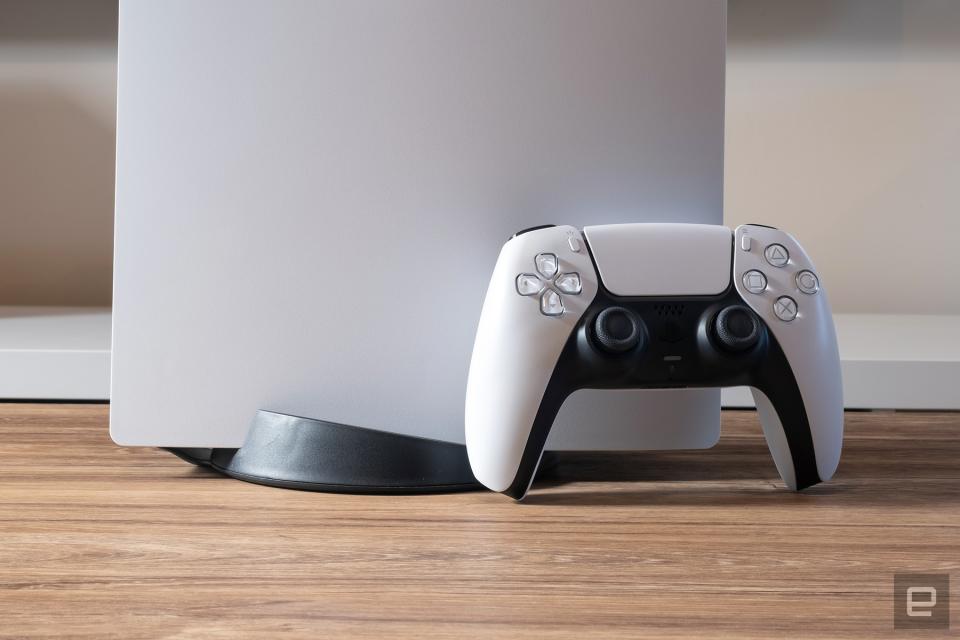
The competition
Unlike Microsoft's consoles, both PS5 models have the same hardware. The only difference is that the $400 "Digital Edition" doesn't have a disc drive of any kind. These days, I tend to download all of my games, but I still like having a disc drive around for playing used titles or my handful of PS4 discs. But if you're not so nostalgic about physical media, it makes sense to get the Digital Edition and save that extra $100 for an extra SSD down the line.
Compared to the Xbox Series X, the PS5 stands out with a far stronger launch lineup and a more innovative controller. But Sony has always been better at nabbing enticing exclusives. And, of course, it has the rights to popular characters like Spider-Man. But if you're more interested in a wide variety of games, as opposed to big budget exclusives, Microsoft may have the leg-up with its GamePass subscription service. That gives you access to a rotating library of titles, all of Microsoft’s first-party games, as well as games from EA Play and eventually Bethesda, all for a single monthly fee. That's something Sony is trying to imitate with its PS Plus Collection free games, which now gives you access to popular PlayStation titles for free. But while those games are great, they include plenty of titles like God of War and Uncharted 4 that many PlayStation fans likely own already.
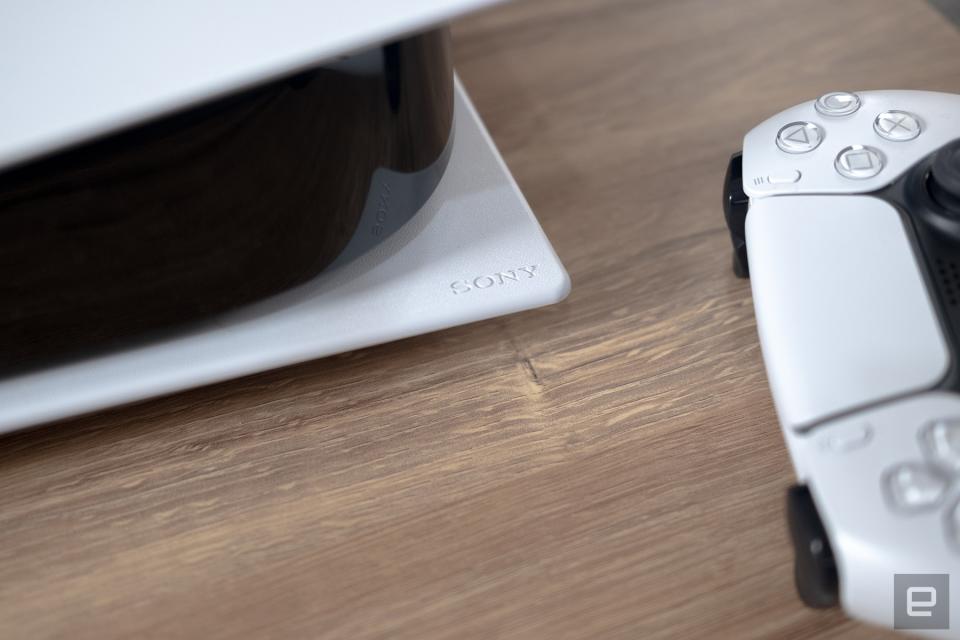
Wrap-up
With the PS5, Sony has managed to deliver a truly next-generation console, even if it went a bit overboard on the design. Its controller is genuinely innovative, and it actually has a bunch of new games you’ll want to play. But I won’t say that Sony has won the next-gen war just yet — maybe just the launch battle. Microsoft remains a strong competitor, especially with Game Pass, xCloud streaming and Bethesda under its wing. But in the end, it doesn’t even matter if there’s actually a decisive winner — just be happy you’ve got two solid consoles to choose from that can take on gaming PCs.
